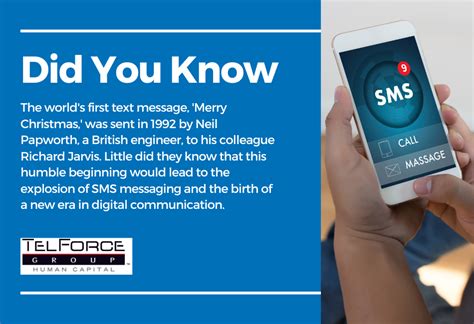The advent of Short Message Service (SMS) in the early 1990s revolutionized the way people communicate, transforming the way we interact with each other and paving the way for the modern messaging apps we use today. Since its inception, SMS has undergone significant transformations, driven by advances in technology, changes in user behavior, and the rise of new platforms. In this article, we will explore the evolution of SMS, its impact on communication, and the factors that have contributed to its enduring popularity.

The Birth of SMS
The first SMS message was sent on December 3, 1992, by Neil Papworth, a British engineer, who sent the message "Merry Christmas" to Richard Jarvis, a colleague, via a personal computer. This pioneering moment marked the beginning of a new era in mobile communication. Initially, SMS was designed as a way to send short messages between mobile phones, with a character limit of 160 characters. The service quickly gained popularity, and by the mid-1990s, SMS had become a standard feature on mobile phones.
Early Adoption and Growth
In the early days of SMS, the service was mainly used by tech-savvy individuals and business users. However, as mobile phone adoption increased, SMS usage expanded to a broader audience. The simplicity and convenience of SMS made it an attractive option for people to communicate with each other, particularly among younger generations. By the early 2000s, SMS had become a ubiquitous form of communication, with billions of messages being sent worldwide every day.

The Impact of SMS on Communication
The rise of SMS has had a profound impact on the way we communicate, transforming the way we interact with each other and revolutionizing the way we share information. Here are some of the key ways in which SMS has changed communication:
- Convenience: SMS provided a quick and easy way to send short messages, eliminating the need for lengthy phone calls or face-to-face conversations.
- Asynchronous communication: SMS allowed users to send messages at any time, without the need for the recipient to be available or present.
- Informal communication: SMS enabled users to communicate in a more informal and relaxed manner, using abbreviations, acronyms, and emojis.

The Rise of Messaging Apps
In recent years, the rise of messaging apps such as WhatsApp, Facebook Messenger, and WeChat has transformed the way we communicate. These apps have built upon the foundation laid by SMS, offering a range of features such as group chats, file sharing, and voice and video calls. Messaging apps have become incredibly popular, with billions of users worldwide.

The Future of SMS
Despite the rise of messaging apps, SMS remains a widely used form of communication, particularly among older generations and in regions with limited internet access. However, the future of SMS is uncertain, as messaging apps continue to evolve and improve. Here are some of the trends that are likely to shape the future of SMS:
- Rich Communication Services (RCS): RCS is a new messaging standard that offers a range of features such as group chats, file sharing, and video calls. RCS has the potential to revolutionize the way we communicate, offering a more interactive and engaging experience.
- Artificial intelligence (AI): AI-powered chatbots are becoming increasingly popular, enabling users to interact with businesses and organizations in a more automated and personalized way.
- 5G networks: The rollout of 5G networks is likely to have a significant impact on SMS, enabling faster data speeds and lower latency.

Conclusion
In conclusion, the texting tech revolution has had a profound impact on the way we communicate, transforming the way we interact with each other and paving the way for the modern messaging apps we use today. As technology continues to evolve, it will be interesting to see how SMS adapts to changing user behavior and advances in technology.
Gallery of SMS Evolution






FAQs
What is SMS?
+SMS stands for Short Message Service, a communication protocol used to send short messages between mobile phones.
When was the first SMS sent?
+The first SMS message was sent on December 3, 1992, by Neil Papworth.
What is the future of SMS?
+The future of SMS is uncertain, but trends such as Rich Communication Services (RCS), artificial intelligence (AI), and 5G networks are likely to shape its evolution.
